6BUnit4知识点整理资料
新译林英语6B_全册知识点梳理(重点词汇、句型、语法知识整理)
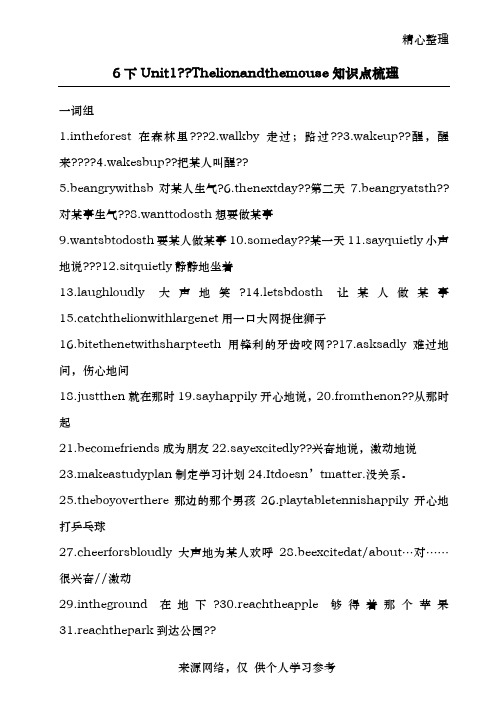
精心整理6下Unit1??Thelionandthemouse知识点梳理一词组1.intheforest在森林里???2.walkby走过;路过??3.wakeup??醒,醒来????4.wakesbup??把某人叫醒??5.beangrywithsb对某人生气?6.thenextday??第二天7.beangryatsth??对某事生气??8.wanttodosth想要做某事9.wantsbtodosth要某人做某事10.someday??某一天11.sayquietly小声地说???12.sitquietly静静地坐着ughloudly大声地笑?14.letsbdosth让某人做某事15.catchthelionwithlargenet用一口大网捉住狮子16.bitethenetwithsharpteeth用锋利的牙齿咬网??17.asksadly难过地问,伤心地问18.justthen就在那时19.sayhappily开心地说,20.fromthenon??从那时起21.becomefriends成为朋友22.sayexcitedly??兴奋地说,激动地说23.makeastudyplan制定学习计划24.Itdoesn’tmatter.没关系。
25.theboyoverthere那边的那个男孩26.playtabletennishappily开心地打乒乓球27.cheerforsbloudly大声地为某人欢呼28.beexcitedat/about…对……很兴奋//激动29.intheground在地下?30.reachtheapple够得着那个苹果31.reachthepark到达公园??32.haveanidea??有一个主意33.bringsomewaterquickly很快拿来水??34.pour…into….??把……倒入……35.Welldone.干得很好。
做的不错??36.somanyballs如此多的求37.somuchbread如此多的面包??????38.take…to…把…….带到…….39.becomehappy变得很开心40.getout 出来,出去二、难点句子1.?Thelionwasangryandwantedtoeatthemouse.这只狮子很生气想要吃那只老鼠。
Unit4单元知识结构图牛津上海版六年级英语下册
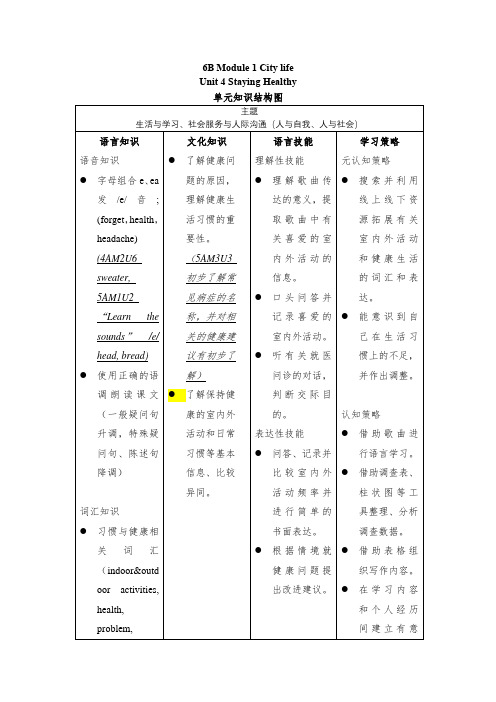
6B Module 1 City life Unit 4 Staying Healthy 单元知识结构图
本单元中,学生将围绕运动与健康这一主题,在阅读与听写活动中获取
室内外活动、健康问题和日常习惯等信息;了解就医问诊的方法,分析可能导致健康,做出改变,提升健康生活意识。
在歌曲学唱中,了解常见室内外活动,认识劳逸结合的健康生活方式;在谈论最喜爱的室内外活动中理解个人喜好的差异,了解调查图表的特点与作用;在Joe和kitty与医生进行有关健康问题的对话中,了解常见健康问题、成因及改善建议;在写作活动中,通过记录日常活动习惯,了解习惯与健康的关联,提升健康意识。
[译林版]6B Unit4 Road safety重点知识归纳
![[译林版]6B Unit4 Road safety重点知识归纳](https://img.taocdn.com/s3/m/cbb71734ed630b1c59eeb570.png)
6B Unit4 Road safety一、语法:一),情态动词归纳1. 情态动词无人称和数的变化;不能单独使用,必须与其后的动词原形构成谓语。
2. 情态动词有四类:①只做情态动词:must, can(could),may(might),ought to②可做情态动词又可做实义动词:need, dare③可做情态动词又可做助动词:shall(should),will(would)④有情态动词特征:have(had) to, used to3.must和have to的区别1) 表示必须、必要。
You must come in time.在回答引出的问句时,肯定回答用must。
如果是否定的,不能用mustn’t(禁止,不准),而用needn’t, don’t have to(不必).---- Must we hand in our exercise books today?---- Yes, you must./No, you don’t have to / you needn’t.2) must是说话人的主观看法,而have to则强调客观需要。
Must只有一般现在时,have to 有更多的时态形式。
二、词组:1. road safety 道路安全2. many busy roads 许多繁忙的道路3.in the city在城市里4. cross the road safely 安全地过马路5. cross a busy road safely安全地通过一条繁忙的马路6. look at the traffic lights 看交通灯7. wait for the green man 等待绿灯8. keep safe 保持安全9. wait on the pavement 在人行道上等待10. look out for cars and bikes 小心小汽车和自行车11. look left/right看左边/右边12. cross the road with other people可以和其他人一起过马路13. see you easily很容易看见你14.some children 一些孩子们15. play on the road 在路上玩16. many cars and bikes 许多小汽车和自行车17. follow the rules 遵守规则18. stay safe on the road 在路上保持安全19. must look for a zebra crossing 必须寻找一条斑马线20. wait for the bus 等待公交车21. wait for me 等我22. find a zebra crossing找到一条斑马线23. mustn’t run quickly 绝不能快速地跑步24. mustn’t walk 绝不能行走25. the left side of the road 马路的左边26. drive on the right side of the road 马路的右边驾驶27. except me 除了我28. except Macau除了澳门29. go to see their aunt去看他们的阿姨30. take the bus 乘车31. get on /off the bus 上车/下车32. so many cars 如此多的车33. so much water 如此多的水34. go fast 快点去35. a red light 一个红灯36. look at the green light 看绿灯37. at the bus stop在公交车站38. must stop 必须停下来39. go on 继续,继续前进40. go to see the doctor 去看医生41. you’re sick 你生病了42. classroom rules 班级规则43. talk loudly 大声地谈论44. keep your desk clean 保持桌子干净45. listen to your teachers in class 在课堂上听老师讲三、句型:1.A: How can you cross the road safely? 你如何安全地过马路?B: I must look for a zebra crossing. 我必须寻找一条斑马线。
6B第四单元知识点
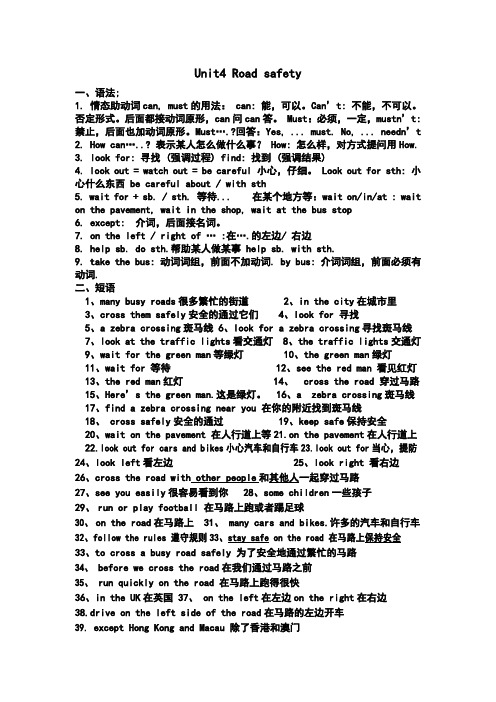
Unit4 Road safety一、语法;1. 情态助动词can, must的用法: can: 能,可以。
Can’t: 不能,不可以。
否定形式。
后面都接动词原形,can问can答。
Must:必须,一定,mustn’t: 禁止,后面也加动词原形。
Must….?回答:Yes, ... must. No, ... needn’t2. How can…..? 表示某人怎么做什么事? How: 怎么样,对方式提问用How.3. look for: 寻找 (强调过程) find: 找到 (强调结果)4. look out = watch out = be careful 小心,仔细。
Look out for sth: 小心什么东西 be careful about / with sth5. wait for + sb. / sth. 等待... 在某个地方等:wait on/in/at : wait on the pavement, wait in the shop, wait at the bus stop6. except: 介词,后面接名词。
7. on the left / right of … :在….的左边/ 右边8. help sb. do sth.帮助某人做某事 help sb. with sth.9. take the bus: 动词词组,前面不加动词. by bus: 介词词组,前面必须有动词.二、短语1、many busy roads很多繁忙的街道2、in the city在城市里3、cross them safely安全的通过它们4、look for 寻找5、a zebra crossing斑马线6、look for a zebra crossing寻找斑马线7、look at the traffic lights看交通灯 8、the traffic lights交通灯 9、wait for the green man等绿灯 10、the green man绿灯11、wait for 等待 12、see the red man 看见红灯13、the red man红灯 14、 cross the road 穿过马路 15、Here’s the green man.这是绿灯。
译林版小学英语6B-Unit4考点精练
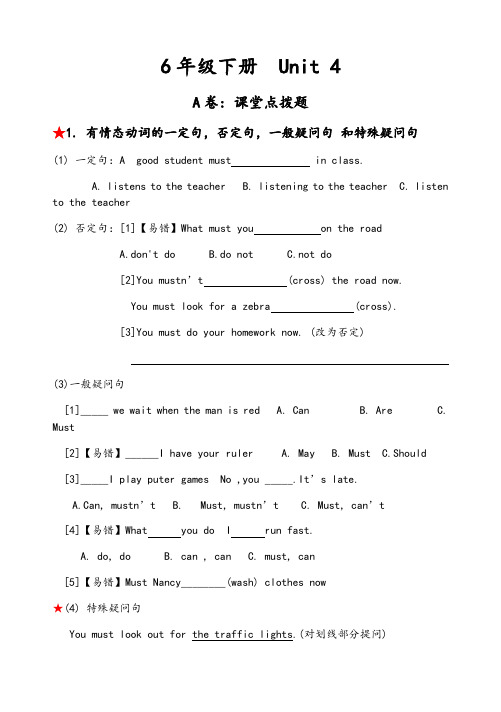
6年级下册 Unit 4A卷: 课堂点拨题★1. 有情态动词的一定句,否定句,一般疑问句和特殊疑问句(1) 一定句:A good student must in class.A. listens to the teacherB. listening to the teacherC. listen to the teacher(2) 否定句:[1]【易错】What must you on the roadA.don't doB.do notC.not do[2]You mustn’t (cross) the road now.You must look for a zebra (cross).[3]You must do your homework now. (改为否定)(3)一般疑问句[1]_____ we wait when the man is red A. Can B. Are C. Must[2]【易错】______I have your ruler A. May B. Must C.Should[3]_____I play puter games No ,you _____.It’s late.A.Can, mustn’tB. Must, mustn’tC. Must, can’t[4]【易错】What you do I run fast.A. do, doB. can , canC. must, can[5]【易错】Must Nancy________(wash) clothes now★(4) 特殊疑问句You must look out for the traffic lights.(对划线部分提问)look out for2. safety安全【名词】 safe安全的【形容词】 safely安全地【副词】(3)道路安全(1)安全地过马路(2)保持安全(4)【易错】--What do you know about road--We must follow the rules and stay on the road.A. safe, safelyB. safety, safeC. safety; safely(5)Road is very important (重要的)A. safety B, safe C.safely(6)【易错】It is to wait on the pavement.A. safetyB.safeC.safely(7)How can you (cross) the road safe).(8)Follow the rules , and stay (safe) on the road!3. 一些交通用语(1)【易错】--How is the traffic in this street -- .A. It’s always busy.B. There are many traffic lights.C. There are many signs.(2) It is safe to cross the road .A. at the bus stopB. at the zebra crossingC. at the traffic lights(3)【易错】You must (one) look left.4. 不定式表示目的(1)To keep ______, you mustn’t run on the road. A. safety B. safe C.safely(2)【易错】 (cross) a busy road safely, we must first look for azebra crossing.(3)It's time (have) lunch.5. 这课里的“动配副”(1)I can walk . A. fast B. quick C. happy(2)【易错】It’s too (easily). I can work it out (easy).(3)I finished my homework . It's so . (easy)(4)Please cross the road (slow).6. 复习There be句型(1)There are some (visit) in our city.(2)There are (three) traffic lights.7. take a/the bus 和 by bus的区别You can a metro to Nanjing. A. by B. inC .take8. 本课的一些短语1.In the UK, people drive (在道路的左边).2. (我最喜欢的食物) is sweet food.3.马路上你一定要当心车辆。
(完整版)上海版牛津英语六年级下册6B重点知识点复习整理(最新整理)

(完整版)上海版牛津英语六年级下册6B重点知识点复习整理(最新整理)上海版牛津英语六年级下册6B重点知识点复习整理Module 1 City LifeUnit 1 Great cities in Asia【知识点梳理】1.方位词:east / west / north / south / north-east / north-west / south-east / south-west用法:a. 两地不相邻: e.g. A is north B. (= to the south of)b. 两地接壤: e.g. A is on the north of B.c. 所属关系,A包含B, B属于A: e.g. B is in the north of A.2. by + 交通工具表示“乘……交通工具”, 用how进行提问e.g. by bus / ferry / train / ship / underground… by plane = by air, by ship = by sea3. How far…多远(询问距离的远近,路程的长短)e.g. Hoe far is it from your home to school? 从你家到学校有多远?4. How long…多长,多久(询问时间的长短,提问一段时间)e.g. How long does it take to travel from Shanghai to Beijing by train? 坐火车从上海到北京要花多长时间?5. It takes (sb.) some time to do sth. 做某事需要花费多少时间e.g. It takes me five hours to make this modal plane. 做这个模型飞机花了我5个小时。
6. like / love / enjoy doing sth. 喜欢做某事e.g. The people in Bangkok like / love / enjoy eating spicy food. 曼谷人喜欢吃辛辣食物。
译林版小学英语6BUnit4考点精练

6年级下册Unit 4A卷: 课堂点拨题★1. 有情态动词的肯定句,否定句,一般疑问句和特殊疑问句(1) 肯定句:A good student must in class.A. listens to the teacherB. listening to the teacherC. listen to the teacher(2) 否定句:[1]【易错】What must you on the road?A.don't doB.do notC.not do[2]You mustn’t(cross) the road now.You must look for a zebra (cross).[3]You must do your homework now. (改为否定)(3)一般疑问句[1]_____ we wait when the man is red? A. Can B. Are C. Must[2]【易错】______I have your ruler? A. May B. Must C.Should[3]_____I play computer games? No ,you _____.It’s late.A.Can, mustn’tB. Must, mustn’tC. Must, can’t[4]【易错】What you do? I run fast.A. do, doB. can , canC. must, can[5]【易错】Must Nancy________(wash) clothes now?★(4) 特殊疑问句You must look out for the traffic lights.(对划线部分提问)look out for?2. safety安全【名词】safe安全的【形容词】safely安全地【副词】(3)道路安全(1)安全地过马路(2)保持安全(4)【易错】--What do you know about road ?--We must follow the rules and stay on the road.A. safe, safelyB. safety, safeC. safety; safely(5)Road is very important (重要的)A. safety B, safe C.safely(6)【易错】It is to wait on the pavement.A. safetyB.safeC.safely(7)How can you (cross) the road safe).(8)Follow the rules , and stay (safe) on the road!3. 一些交通用语(1)【易错】--How is the traffic in this street? -- .B. There are many traffic lights.C. There are many signs.A. It’s always busy.(2) It is safe to cross the road .A. at the bus stopB. at the zebra crossingC. at the traffic lights(3)【易错】You must (one) look left.4. 不定式表示目的(1)To keep ______, you mustn’t run on the road.A. safetyB. safeC. safely(2)【易错】(cross) a busy road safely, we must first look for a zebra crossing.(3)It's time (have) lunch.5. 这课里的“动配副”(1)I can walk . A. fast B. quick C. happy(2)【易错】It’s too (easily). I can work it out (easy).(3)I finished my homework . It's so . (easy)(4)Please cross the road (slow).6. 复习There be句型(1)There are some (visit) in our city.(2)There are (three) traffic lights.7. take a/the bus 和by bus的区别You can a metro to Nanjing. A. by B. in C .take8. 本课的一些短语1.In the UK, people drive (在道路的左边).2. (我最喜欢的食物) is sweet food.3.马路上你一定要当心车辆。
6B Unit4 Road safety重点知识归纳
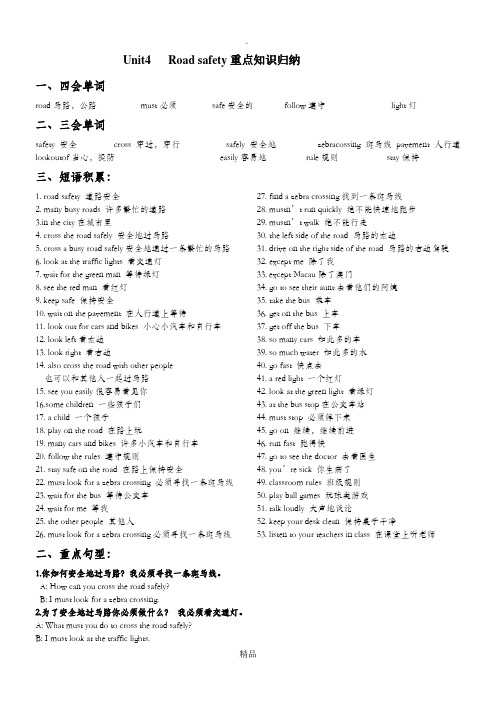
Unit4 Road safety重点知识归纳一、四会单词road马路,公路must必须safe安全的follow遵守light灯二、三会单词safety安全cross穿过,穿行safely安全地zebracossing斑马线pavement人行道lookoutof当心,提防easily容易地rule规则stay保持三、短语积累:1. road safety 道路安全2. many busy roads 许多繁忙的道路3.in the city在城市里4. cross the road safely 安全地过马路5. cross a busy road safely安全地通过一条繁忙的马路6. look at the traffic lights 看交通灯7. wait for the green man 等待绿灯8. see the red man 看红灯9. keep safe 保持安全10. wait on the pavement 在人行道上等待11. look out for cars and bikes 小心小汽车和自行车12. look left看左边13. look right 看右边14. also cross the road with other people也可以和其他人一起过马路15. see you easily很容易看见你16.some children 一些孩子们17. a child 一个孩子18. play on the road 在路上玩19. many cars and bikes 许多小汽车和自行车20. follow the rules 遵守规则21. stay safe on the road 在路上保持安全22. must look for a zebra crossing 必须寻找一条斑马线23. wait for the bus 等待公交车24. wait for me 等我25. the other people 其他人26. must look for a zebra crossing必须寻找一条斑马线27. find a zebra crossing找到一条斑马线28. mustn’t run quickly 绝不能快速地跑步29. mustn’t walk 绝不能行走30. the left side of the road 马路的左边31. drive on the right side of the road 马路的右边驾驶32. except me 除了我33. except Macau除了澳门34. go to see their aunt去看他们的阿姨35. take the bus 乘车36. get on the bus 上车37. get off the bus 下车38. so many cars 如此多的车39. so much water 如此多的水40. go fast 快点去41. a red light 一个红灯42. look at the green light 看绿灯43. at the bus stop在公交车站44. must stop 必须停下来45. go on 继续,继续前进46. run fast 跑得快47. go to see the doctor 去看医生48. you’re sick 你生病了49. classroom rules 班级规则50. play ball games 玩球类游戏51. talk loudly 大声地谈论52. keep your desk clean 保持桌子干净53. listen to your teachers in class 在课堂上听老师二、重点句型:1.你如何安全地过马路?我必须寻找一条斑马线。
六年级英语下册 Unit4知识点梳理

六年级英语下册 Unit4知识点梳理六年级英语下册 Unit4知识点梳理Unit 4 重点词汇、句型、语法知识Road safety 道路安全,马路安全2. There are many busy road在城市里有许多繁忙的马路。
many busy roads 许多繁忙的马路在城市里How can youad safely? 你怎样安全过马路?ad safely 安全地过马路u must la zebrag. 你必须找一条斑马线。
la zebrag 寻找一条斑马线u must look aaffic lights and wagreen man. 你必须看交通灯,并且等待绿灯。
look aaffic lights 看交通灯 wagreen man 等待绿灯wabus 等待公交车 wa等我an youd man? 你看见红灯了吗?d man 看见红灯u mustn’ad now. 现在你禁止过马路。
ad 过马路u caad now.你现在可以过马路了。
da zebrag near you 在你附近找到斑马线10. Tafe, you can waavement and look out for cars and b为保证安全,你可以在人行道上等,并且当心小汽车和自行车。
句首用to表目的,意为“为了……”afe = stay safe 保持安全waavement 在人行道上等待look out for cars and bikes 当心小汽车和自行车 look out for 当心,当心u mulook lght and then left aga你必须先看左边,然后看右边,再看左边。
look left 向左看 look right 向右看 look left and right 左右看看12. You can alad wle.你也可以和其他人一起过马路。
ad wle和其他人一起过马路u easily很容易看见你ldren 一些孩子们a child 一个孩子un or play footballad 在马路上奔跑或踢足球u mulaad becauare many cars and b你禁止在马路上玩耍,因为有很多小汽车和自行车。
上海牛津版英语六年级下册6BUnit4U4同步讲义

学员编号:年级:课时数:学员姓名:辅导科目:英语学科教师:授课类型T Unit4(牛津6下)基础知识梳理教学目标1、使学生能够基本掌握牛津6年级下册Unit4中的基础词汇及重要句型;星级★★★授课日期及时段T同步-U4基础知识梳理(建议2-5分钟)批注:上面图片涉及到孩子们平时的室外活动,和学生讨论平时喜欢什么类型的室内外活动,并讨论活动的意义,导出主题stay healthy。
(建议20-25分钟)想知道更多的室内外活动及其意义吗?让我们先扫开单词障碍吧!一、词汇Words1. indoor adj.室内的,户内的e. g. an indoor pool一个室内游泳池indoor paint室内画an indoor party户内聚会indoor gardening户内园艺2. outdoor adj.室外的,户外的e. g. outdoor games户外运动an outdoor pool户外游泳池an outdoor theatre露天剧场lead an outdoor life在野外生活批注:这里可以引入常见的室内外活动的英文表达,可以为孩子写作文积累素材。
丢沙包:earth bags; 踢毽子:Shuttlecock;跳绳:rope skipping;打篮球:play basketball;踢足球:play football;打排球:play volleyball;游泳:;画画:drawing;弹钢琴:play the piano;郊游:go for an outing;露营:go camping。
4. forget v. (过去式forgot,过去分词forgotten,现在分词forgetting)忘记e. g. -I'm sorry I've forgotten your name.很抱歉,我忘了你的名字。
-I'm John. We met on the first day of school.我叫约翰,我们在开学第一天见过面。
最新新版PEP小学英语六年级下册Unit-4-知识归纳
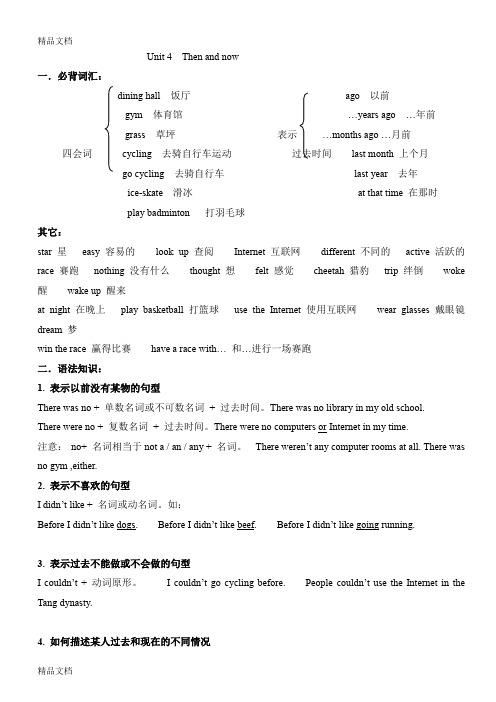
Unit 4 Then and now一.必背词汇:dining hall 饭厅ago 以前gym 体育馆…years ago …年前grass 草坪表示…months ago …月前四会词cycling 去骑自行车运动过去时间last month 上个月go cycling 去骑自行车last year 去年ice-skate 滑冰at that time 在那时play badminton 打羽毛球其它:star星easy 容易的look up 查阅Internet 互联网different 不同的active 活跃的race赛跑nothing 没有什么thought 想felt 感觉cheetah 猎豹trip 绊倒woke 醒wake up 醒来at night 在晚上play basketball 打篮球use the Internet 使用互联网wear glasses 戴眼镜dream 梦win the race 赢得比赛have a race with…和…进行一场赛跑二.语法知识:1. 表示以前没有某物的句型There was no + 单数名词或不可数名词+ 过去时间。
There was no library in my old school.There were no + 复数名词+ 过去时间。
There were no computers or Internet in my time.注意:no+ 名词相当于not a / an / any + 名词。
There weren’t any computer rooms at all. There was no gym ,either.2. 表示不喜欢的句型I didn’t like + 名词或动名词。
如:Before I didn’t like dogs. Before I didn’t like beef. Before I didn’t like going running.3. 表示过去不能做或不会做的句型I couldn’t + 动词原形。
6B Unit4 Road safety
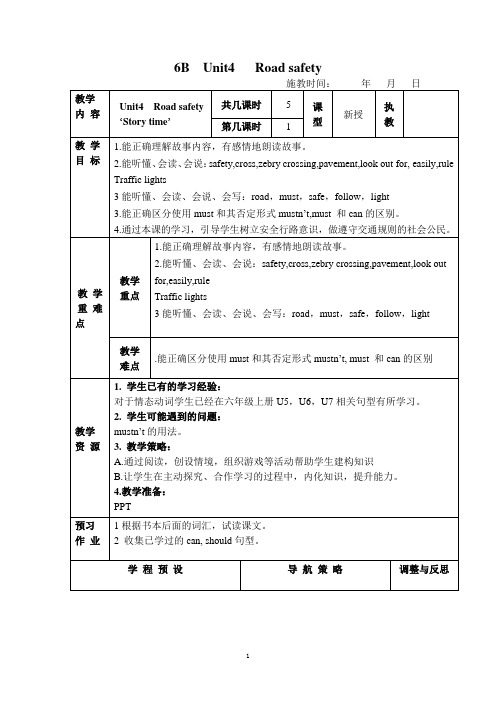
Step5. Checkout.(10分钟)
完成《课课练》P23,相应练习。
Step6.Homework.(1分钟)
课课练P24 P27.
将学生分成五人小组,仿照范例,开展红绿灯游戏问答。其中一人扮作小交警,提出问题,指定某人回答。在其回答后,其他人要给予反馈。
教师假设自己是某卡通人物,来到这个城市,想要参观图书馆,要求学生告诉自己应遵守的规则,巩固must的用法。
Step3.While-reading(15分钟)
1. Watch and judge.
2.自读课文第二部分,完成表格信息.
When no zebra crossing around
Wait on the
Look out forand.
Lookfirst, thenand then again.
Cross the road with other.
1根据书本后面的词汇,试读课文。
2收集已学过的can, should句型。
学程预设
导航策略
调整与反思
Step1.Learning aims(1分钟)
Step2.Pre-reading(6分钟)
1.Free talk
2.Play a game
3.引入并教学生词新句。
同时引入本课的课题
4小组活动,完成书本P38 Look and say
Step1.Learning aims(1分钟)
Step2.Presentation(14分钟)
A.Sound time
1.欣赏歌谣,感知重音
2.跟读录音。
3.介绍重读规则。
4.学生尝试读,体会重读和弱读。
B.Cartoon time
译林版小学英语6B Unit4考点精练
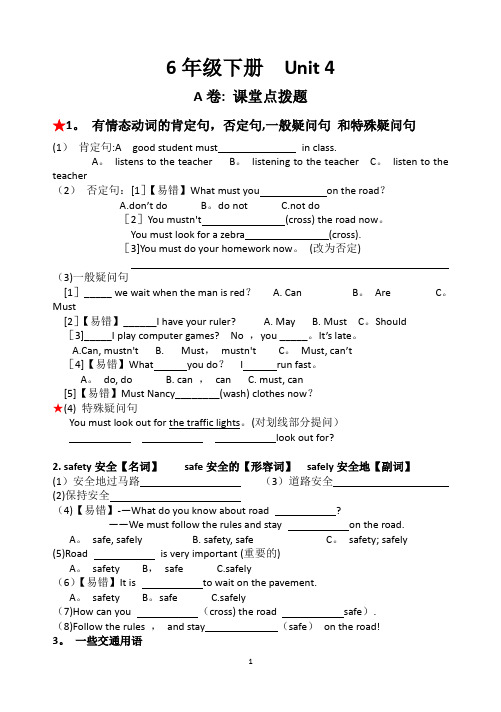
6年级下册Unit 4A卷: 课堂点拨题★1。
有情态动词的肯定句,否定句,一般疑问句和特殊疑问句(1)肯定句:A good student must in class.A。
listens to the teacher B。
listening to the teacher C。
listen to the teacher(2)否定句:[1]【易错】What must you on the road?A.don’t do B。
do not C.not do[2]You mustn't (cross) the road now。
You must look for a zebra (cross).[3]You must do your homework now。
(改为否定)(3)一般疑问句[1]_____ we wait when the man is red? A. Can B。
Are C。
Must[2]【易错】______I have your ruler? A. May B. Must C。
Should[3]_____I play computer games? No ,you _____。
It’s late。
A.Can, mustn'tB. Must,mustn't C。
Must, can’t[4]【易错】What you do?I run fast。
A。
do, do B. can ,can C. must, can[5]【易错】Must Nancy________(wash) clothes now?★(4) 特殊疑问句You must look out for the traffic lights。
(对划线部分提问)look out for?2. safety安全【名词】safe安全的【形容词】safely安全地【副词】(3)道路安全(1)安全地过马路(2)保持安全(4)【易错】-—What do you know about road ?——We must follow the rules and stay on the road.A。
译林版小学英语6B-Unit4考点精练
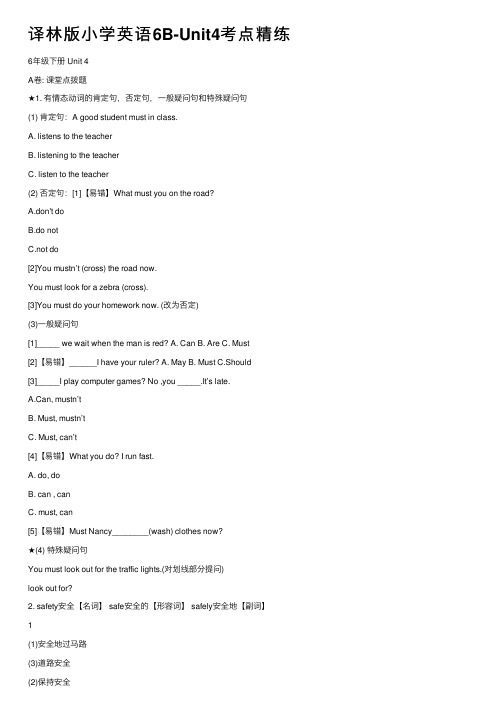
译林版⼩学英语6B-Unit4考点精练6年级下册 Unit 4A卷: 课堂点拨题★1. 有情态动词的肯定句,否定句,⼀般疑问句和特殊疑问句(1) 肯定句:A good student must in class.A. listens to the teacherB. listening to the teacherC. listen to the teacher(2) 否定句:[1]【易错】What must you on the road?A.don't doB.do notC.not do[2]You mustn’t (cross) the road now.You must look for a zebra (cross).[3]You must do your homework now. (改为否定)(3)⼀般疑问句[1]_____ we wait when the man is red? A. Can B. Are C. Must[2]【易错】______I have your ruler? A. May B. Must C.Should[3]_____I play computer games? No ,you _____.It’s late.A.Can, mustn’tB. Must, mustn’tC. Must, can’t[4]【易错】What you do? I run fast.A. do, doB. can , canC. must, can[5]【易错】Must Nancy________(wash) clothes now?★(4) 特殊疑问句You must look out for the traffic lights.(对划线部分提问)look out for?2. safety安全【名词】 safe安全的【形容词】 safely安全地【副词】1(1)安全地过马路(4)【易错】--What do you know about road ?--We must follow the rules and stay on the road.A. safe, safelyB. safety, safeC. safety; safely(5)Road is very important (重要的)A. safety B, safe C.safely(6)【易错】It is to wait on the pavement.A. safetyB.safeC.safely(7)How can you (cross) the road safe).(8)Follow the rules , and stay (safe) on the road!3. ⼀些交通⽤语(1)【易错】--How is the traffic in this street? -- .A. It’s always busy.B. There are many traffic lights.C. There aremany signs.(2) It is safe to cross the road .A. at the bus stopB. at the zebra crossingC. at the trafficlights(3)【易错】You must (one) look left.4. 不定式表⽰⽬的(1)To keep ______, you mustn’t run on the road. A. safety B. safeC. safely(2)【易错】 (cross) a busy road safely, we must first look for a zebra crossing.(3)It's time (have) lunch.5. 这课⾥的“动配副”(1)I can walk . A. fast B. quick C. happy(2)【易错】It’s too (easily). I can work it out (easy).(4)Please cross the road (slow).6. 复习There be句型(1)There are some (visit) in our city.(2)There are (three) traffic lights.7. take a/the bus 和 by bus的区别You can a metro to Nanjing. A. by B. inC .take8. 本课的⼀些短语1.In the UK, people drive (在道路的左边).2. (我最喜欢的⾷物) is sweet food.23.马路上你⼀定要当⼼车辆。
(完整版)【个人精心制作】新译林小学英语6BUNIT4单元知识点总结及单元练习题

新译林小学英语6BUNIT4单元知识点总结及单元练习题Unit4 Road safety一、四会单词1.road马路,公路2.must必须3.safe安全的4.follow遵守5.light灯二、三会单词1.safety安全2.cross穿过,穿行3.safely安全地4.zebra cros sing斑马线5.pavement人行道6.look out of当心,提防7.easily容易地8. rule规则9. stay保持三、短语积累:1. road safety 道路安全2. many busy roads 许多繁忙的道路3.in the city在城市里4. cross the road safely 安全地过马路5. cross a busy road safely安全地通过一条繁忙的马路6. look at the traffic lights 看交通灯7. wait for the green man 等待绿灯8. see the red man 看红灯9. keep safe 保持安全10. wait on the pavement 在人行道上等待11. look out for cars and bikes 小心小汽车和自行车12. look left看左边13. look right 看右边14. also cross the road with other people也可以和其他人一起过马路15. see you easily很容易看见你16.some children 一些孩子们17. a child 一个孩子18. play on the road 在路上玩19. many cars and bikes 许多小汽车和自行车20. follow the rules 遵守规则21. stay safe on the road 在路上保持安全22. must look for a zebra crossing 必须寻找一条斑马线23. wait for the bus 等待公交车24. wait for me 等我25. the other people 其他人26. must look for a zebra crossing必须寻找一条斑马线27. find a zebra crossing找到一条斑马线28. mustn’t run quickly 绝不能快速地跑步29. mustn’t walk 绝不能行走30. the left side of the road 马路的左边31. drive on the right side of the road 马路的右边驾驶32. except me 除了我33. except Macau除了澳门34. go to see their aunt去看他们的阿姨35. take the bus 乘车36. get on the bus 上车37. get off the bus 下车38. so many cars 如此多的车39. so much water 如此多的水40. go fast 快点去41. a red light 一个红灯42. look at the green light 看绿灯43. at the bus stop在公交车站44. must stop 必须停下来45. go on 继续,继续前进46. run fast 跑得快47. go to see the doctor 去看医生48. you’re sick 你生病了49. classroom rules 班级规则50. play ball games 玩球类游戏51. talk loudly 大声地谈论四、语法总结情态助动词的用法:表示说话人的情绪、态度或与语气的动词,但不能单独作谓语,无人称和数的变化,只能和其他动词原形构成谓语。
6B Unit 4知识点

get to 到达take the bus 乘公共汽车get on the bus上公共汽车so many cars 如此多的车a red light红灯I see 我明白了go on继续1.How can you cross them safely ?你怎样才能安全过马路呢?[解析] “How can you…?”是询问对方怎样做某事时的用语,意为“你怎样才能…”.[例句]—How can you get to Shanghai?---By train.[例题]对划线部分提问。
I can go there on foot.you there?2.To keep safe,you can wait on the pavement.为了保证安全,你可以在人行道上等。
[解析]“To keep safe”是动词不定式短语,在句中做目的状语。
[例句] (1) To catch the early bus,they get up early.为了赶上早班车,他们早早地起床。
(2)To get stronger,you must do more exercise.为了让身体更强壮,你必须做更多的锻炼。
[例题]根据中文意思,完成句子。
为了保护地球,我们应当节约能源。
To ,we should save energy.3.You must not play on the road because there are many cars and bikes.你们千万不要在马路上玩耍,因为马路上有许多汽车和自行车。
[解析]此句是由because引导的原因状语从句,对其提问时,应用疑问词why 来提问。
[例句] He didn’t go out yesterday because it rained hard.因为下大雨,他昨天没有出门。
[例题]对划线部分提问。
Cinderella is sad because she can’t go to the party.Cinderella ?4.How do we get to your house?我们怎样才能到达你家?[解析] How do I/we get to…?”是询问某人如何去某地时的常用句式,to 后接地点名词,如果后接地点为副词here,there,home时则不加to.[例句]---How do we get to the cinema?---You can take bus No.6.[例题]根据中文意思,完成句子。
六年级下册英语知识点梳理-Unit4 We can save the animals 教科版
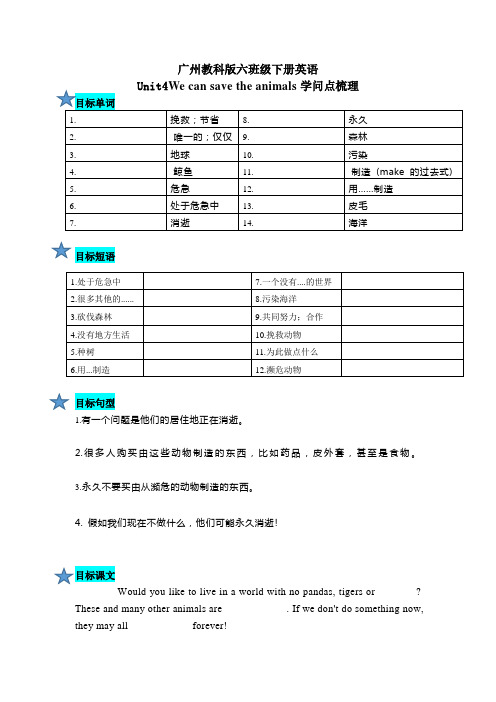
目标短语目标句型1.有一个问题是他们的居住地正在消逝。
______________________________________________2.很多人购买由这些动物制造的东西,比如药品,皮外套,甚至是食物。
_____________________________________________________ 3.永久不要买由从濒危的动物制造的东西。
_____________________________________________________4. 假如我们现在不做什么,他们可能永久消逝!_____________________________________________________One _________ is that their homes are disappearing. People cut down the forests and _________ the oceans, so these animals have no place to live in. Also, many people buy things ____________ these animals, like medicines, fur coats and even foods.If you love the earth and love the animals, please do something about it.___________ buy things made from animals in danger. Plant trees and don't pollute. If we all_____________ we can still save the animals.目标语言点1.确定句中并列部分最终两个词用and连接,否定句中用or连接。
例: I like to eat bananas,grapes and oranges.I have a rabbit,a cat and two birds.I don't want to live in a world with no pandas, tigers or whales.I don’t have any toys or pets.2.like除了作“宠爱”讲,还可以用于举例,意思相当于“如,诸如”例: People often keep animals like cats,dogs and rabbits.3. be made from与be made of的辨析词汇释义辨析例句be made from 用…制成成品看不出原材料The medicine is made from animals. be made of 由…制成成品能看得出原材料The table is made of wood.5. If we don't do something now, they may all disappear forever!这句话中包含了一个由if引导的条件状语从句。
新译林 6B Unit 4 Road safety 知识点梳理
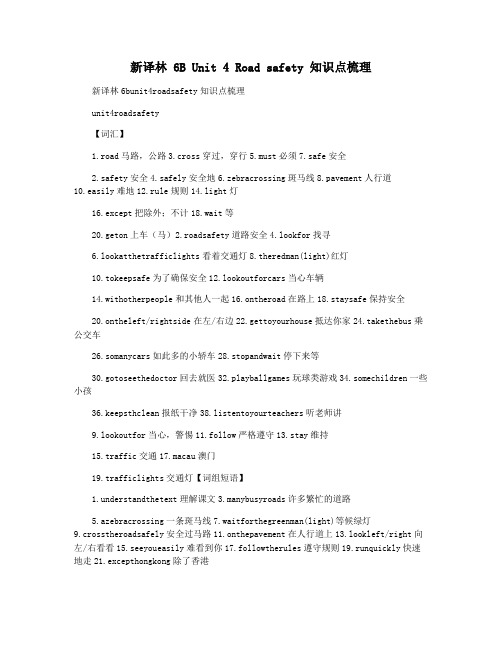
新译林 6B Unit 4 Road safety 知识点梳理新译林6bunit4roadsafety知识点梳理unit4roadsafety【词汇】1.road马路,公路3.cross穿过,穿行5.must必须7.safe安全2.safety安全4.safely安全地6.zebracrossing斑马线8.pavement人行道10.easily难地12.rule规则14.light灯16.except把除外;不计18.wait等20.geton上车(马)2.roadsafety道路安全4.lookfor找寻6.lookatthetrafficlights看着交通灯8.theredman(light)红灯10.tokeepsafe为了确保安全12.lookoutforcars当心车辆14.withotherpeople和其他人一起16.ontheroad在路上18.staysafe保持安全20.ontheleft/rightside在左/右边22.gettoyourhouse抵达你家24.takethebus乘公交车26.somanycars如此多的小轿车28.stopandwait停下来等30.gotoseethedoctor回去就医32.playballgames玩球类游戏34.somechildren一些小孩36.keepsthclean报纸干净38.listentoyourteachers听老师讲9.lookoutfor当心,警惕11.follow严格遵守13.stay维持15.traffic交通17.macau澳门19.trafficlights交通灯【词组短语】1.understandthetext理解课文3.manybusyroads许多繁忙的道路5.azebracrossing一条斑马线7.waitforthegreenman(light)等候绿灯9.crosstheroadsafely安全过马路11.onthepavement在人行道上13.lookleft/right向左/右看看15.seeyoueasily难看到你17.followtherules遵守规则19.runquickly快速地走21.excepthongkong除了香港23.gotoseetheiraunt去看他们的阿姨25.getonthebus上公交车27.goon继续29.stopagain又停下来31.besick生病了33.classroomrules班规35.gofast跑(走)得慢37.talkloudly大声骂人【语法】本单元学习的语法内容有两个:一是学习“must,mustn’t”的用法;二是复习“can,can’t,cannot”的用法。
6B Unit 4知识点整理
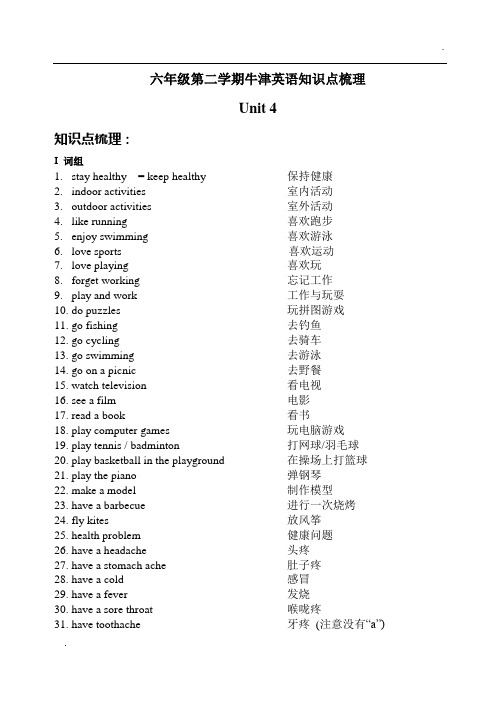
六年级第二学期牛津英语知识点梳理Unit 4知识点梳理:I 词组1.stay healthy = keep healthy 保持健康2.indoor activities 室内活动3.outdoor activities 室外活动4.like running 喜欢跑步5.enjoy swimming 喜欢游泳6.love sports 喜欢运动7.love playing 喜欢玩8.forget working 忘记工作9.play and work 工作与玩耍10.do puzzles 玩拼图游戏11.go fishing 去钓鱼12.go cycling 去骑车13.go swimming 去游泳14.go on a picnic 去野餐15.watch television 看电视16.see a film 电影17.read a book 看书18.play computer games 玩电脑游戏19.play tennis / badminton 打网球/羽毛球20.play basketball in the playground 在操场上打篮球21.play the piano 弹钢琴22.make a model 制作模型23.have a barbecue 进行一次烧烤24.fly kites 放风筝25.health problem 健康问题26.have a headache 头疼27.have a stomach ache 肚子疼28.have a cold 感冒29.have a fever 发烧30.have a sore throat 喉咙疼31.have toothache 牙疼(注意没有“a”)32.I’m afraid 恐怕(表示婉转语气)33.too much + 不可数名词太多34.too many + 可数名词35.too little+ 不可数名词太少36.too few + 可数名词37.watch too much television 看太多的电视(*watch television for too long)38.watch less television 看少一点电视39.wear enough clothes 穿(着)足够多的衣服40.*put on 穿上41.wear more clothes 穿更多的衣服42.eat too much spicy food 吃更多的辛辣食物43.have exercise 做运动44.once a day 一天一次45.twice a week 一周两次46.three times a month 一个月三次47.go to bed late 晚睡48.go to bed early 早睡49.practise swimming 练习游泳50.*practise doing sth. 练习做某事51.help do the housework 帮助做家务52.*help sb. (to) do sth./ help sb. with sth. 帮助某人做某事II. 词性转换1.act (v.)—activity (n.) activities (pl.) *active (a.)e.g. We take part in all kinds of activities.He is very active in class.2.health (n.) — healthy (adj.) —unhealthy (a.)e.g. Health is the most important thing.You should eat healthy food.3.real (adj.) — really (adv.)e.g. It’s really cold today.He who doesn't reach the Great Wall is not a real man .4.tooth (n.)—teeth (pl.) —toothachee.g. You eat too much sweet food, so you always have toothache.5.fun (n.)—* funny (a.)e.g. The children had fun at the beach yesterday.It’s a funny story.6.many/ much (a. ad.) —moree.g. You should drink more water.7.little—less; few—fewere.g. You should watch less televsion.8.one—once two – twicee.g. I go to school once a week.III. 语言点/句型1.*stay healthystay 在这里意为“保持”,相当于keep, 后接形容词stay with his cousin “逗留“*health 名词healthy 形容词2.like / love / enjoy + doing 其中enjoy 后面只能加doingenjoy 喜爱,享受……乐趣* enjoy oneself = have a good timelike to do / like doing前者强调某一具体行为,后者则强调抽象概念或某一类事物e.g. I like to read his novel. I like reading.3. forget doing sth. 忘记做过某事*forget to do sth. 忘记去做某事*remember to do sth. 记得去做某事*remember doing sth. 记得做过某事4. really adv. 真正地= trulye.g. I really enjoy watching cartoon.real – reallyIt’s really cold today.He who doesn't reach the Great Wall is not a real man .5. fun n. --- funny adj.have fun / have a lot of fun What fun it is !like doingfavourite adj. like sth bestI like doing puzzles best.Doing puzzles is my favourite .7. 用动名词来表述一些活动的名称e.g. swimming , making a model8. --- Why do I always have a headache?--- It’s because you watch too much television,I’m afraid.注:Why 提问要用because 回答。
- 1、下载文档前请自行甄别文档内容的完整性,平台不提供额外的编辑、内容补充、找答案等附加服务。
- 2、"仅部分预览"的文档,不可在线预览部分如存在完整性等问题,可反馈申请退款(可完整预览的文档不适用该条件!)。
- 3、如文档侵犯您的权益,请联系客服反馈,我们会尽快为您处理(人工客服工作时间:9:00-18:30)。
六年级第二学期牛津英语知识点梳理Unit 4知识点梳理:I 词组1. stay healthy = keep healthy2. indoor activities3. outdoor activities4. like running5. enjoy swimming6. love sports7. love playing8. forget working9. play and work 10. do puzzles 11. go fishing 12. go cycling 13. go swimming 14. go on a picnic 15. watch television 16. see a film 17. read a book18. play computer games 19. play tennis / badminton20. play basketball in the playground 21. play the piano 22. make a model 23. have a barbecue 24. fly kites25. health problem 26. have a headache 27. have a stomach ache 28. have a cold 29. have a fever30. have a sore throat 31. have toothache 32.I ' m afraid精品文档 保持健康 室内活动 室外活动 喜欢跑步 喜欢游泳 喜欢运动 喜欢玩 忘记工作 工作与玩耍 玩拼图游戏 去钓鱼 去骑车 去游泳 去野餐 看电视 电影 看书 玩电脑游戏 打网球 /羽毛球 在操场上打篮球 弹钢琴 制作模型 进行一次烧烤 放风筝 健康问题 头疼 肚子疼 感冒 发烧 喉咙疼 牙疼 (注意没有 “ a ” ) 恐怕(表示婉转语气)精品文档33. too much + 不可数名词 34. too many + 可数名词35. too little+ 不可数名词 36. too few + 可数名词37. watch too much television (*watch televisionfor too long)38. watch less television 39. wear enough clothes 40. *put on41. wear more clothes42. eat too much spicy food 43. have exercise 44. once a day 45. twice a week46. three times a month 47. go to bed late 48. go to bed early 49. practise swimming 50. *practise doing sth. 51. help do the housework52. *help sb. (to) do sth./ help sb. with sth.II. 词性转换1. act (v.)—activity (n.) activities (pl.) *active (a.)e.g. We take part in all kinds ofactivities. He is very active in class. 2. health (n.) — healthy (adj.) —unhealthy (a.)e.g. Health is the most important thing. You should eathealthy food. 3. real (adj.) — really (adv.)e.g. It 's really cold today.He who doesn't reach the Great Wall is not areal man . 4. tooth (n.)—teeth (pl.) —toothachee.g. You eat too much sweet food, so you always havteoothache. 5. fun (n.)— * funny (a.)e.g. The children hadfun at the beach yesterday. It 'sa funny story. 6. many/ much (a. ad.)— moree.g. You should drinkmore water.精品文档7. little — less; few — fewere.g. You should watchless televsion.太多 太少看太多的电视 看少一点电视 穿(着)足够多的衣服 穿上穿更多的衣服 吃更多的辛辣食物 做运动 一天一次 一周两次 一个月三次 晚睡 早睡 练习游泳 练习做某事 帮助做家务 帮助某人做某事8. one—once two -twicee.g. I go to schoolonce a week.III. 语言点/ 句型1.*stay healthystay 在这里意为“保持”,相当于keep, 后接形容词stay with his cousin “逗留“*health 名词healthy 形容词2.like / love / enjoy + doing 其中enjoy 后面只能加doingenjoy 喜爱,享受..... 乐趣* enjoy on eself = have a good timelike to do / like doing 前者强调某一具体行为,后者则强调抽象概念或某一类事物e.g. I like to read his novel. I like reading.3. forget doing sth. 忘记做过某事*forget to do sth. 忘记去做某事*remember to do sth. 记得去做某事*remember doing sth. 记得做过某事4. really adv. 真正地= trulye.g. I really enjoy watching cartoon.real -reallyIt 's really cold today.He who doesn't reach the Great Wall is not a real man .5. fun n. --- funny adj.have fun / have a lot of fun What fun it is !like doingfavourite adj. like sth bestI like doing puzzles best.Doing puzzles is my favourite .7. 用动名词来表述一些活动的名称e.g. swimming , making a model8. --- Why do I always have a headache?--- It 's because you watch too much television,I 'm afraid.注:Why提问要用because回答。
目前,对because引导的从句,只要求理解和模仿操练。
I 'm afraid 恐怕(表示婉转语气)be afraid of sth / doing sth9. You should watch less television.注:less意为更少,是little的比较级,修饰不可数名词,精品文档与too much相对应。
fewer(更少的)是few的比较级,修饰可数名词,与too many 相对应。
10. It 's because you don 't wear enough clothes, I 'm afraid. enough 意为“足够的,足够地”名词放在eno ugh 的后面,eno ugh mon ey, eno ugh time形容词放在eno ugh 的前面,big eno ugh, cool eno ugh11. You should ( not) wear more clothes.向对方提出建议时可用You should +动词原形意为:你应该有相似功能的句型还有:You' d better + 动词原形意为:你最好- You'd better = You had betterYou had better (not) wear more clothes.12. --How often do you watch television?--I watch television four times a day. 。
注:how often用于对频率次数”的提问。
对一系列表示频率的副词提问也要用how often . 如:always, usually,often, sometimes, never 13. Summary: 日常交际用语1) --- What ‘s youravfourite indoor activity?--- I like doing puzzles at home. That 's my favourite indoor activity. 2) --- Why do I always have a stomach ache ?--- It 's because you eat too much spicy food, I 'm afraid.3) --- How often do you watch TV?--- I watch television four times a week.。
